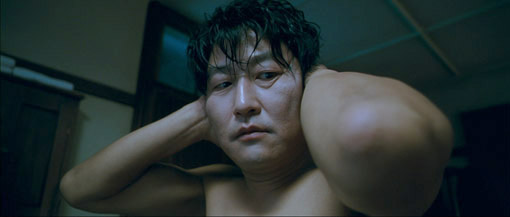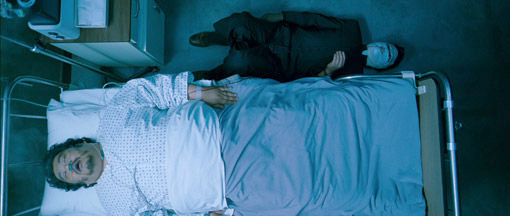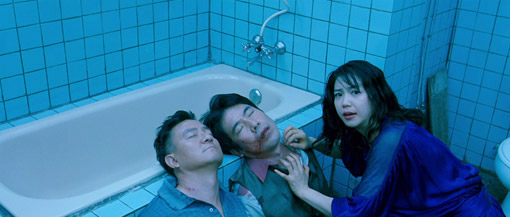|
You don't have to be a student of the vampire movie to know the genre rules. Vampires are undead humanoid creatures, usually male and traditionally aristocratic, and they feed off the blood of the (preferably female) living. If the victim dies as a result of this feeding then they too will become a vampire. Vampires are often blessed with extraordinary strength and even hypnotic powers, and are resistant to injuries that would kill a mere mortal. Crucifixes and garlic send them scurrying and they can be killed by a stake through the heart or direct exposure to sunlight. These conventions were established early in the genre's evolution by the likes of Bram Stoker, Sheridan Le Fanu, F.W. Murnau and Tod Browning, and were quickly reinforced by the films and novels that followed.
For a while the vampire movie got by on variations on established themes, then in the late '50s was re-energized by Britain's Hammer studios, but in the 1970s the revisionist films began appearing and everything changed. From this point on the vampire movie needed originality to make its mark on the genre. Some rules could not be messed with – if you dispense with the blood drinking then it's no longer a vampire story, and having your vampire walk around freely in daylight is a surefire way to invite audience scorn – but just about everything else is up for grabs. The problem for modern vampire tales is that those revisionist films, made as they were during a period of considerable creative freedom, left future filmmakers with precious few new pathways to explore without corrupting the core of what defines the genre in the first place.

A while ago on this very site I claimed that the vampire movie had long since passed its prime and was in a state of terminal decline. Then Let the Right One In [Låt den rätte komma in] came along and I was given cause to eat my words, or at least a good many of them. I still believe that the genre has passed its creative peak, but I'll happily admit that reports of its impending death were a little premature. One great film does not a revival make, and with the genre undergoing a process of homogenisation via a string of uninspiring and almost identically styled TV series, we're all anxiously waiting for the film that confirms Tomas Alfredson's masterwork was not a one-off. And surely if anyone could tell a truly revolutionary new vampire story it would be Korean maestro Park Chan-wook, the man who so brilliantly punished his audience with the likes of Sympathy for Mr. Vengeance and Oldboy. Ah, well, not quite...
Korean screen favourite Song Kang-ho (Sympathy for Mr. Vengeance, Memories of Murder, The Host) stars as Father Sang-hyeon, a Catholic priest who flies in the face of Vatican advice and volunteers as a test subject for biochemical experiment to find a vaccine for the deadly Emmanuel virus. It's a high risk procedure that proves fatal for Sang-hyeon, but just seconds after he's been pronounced dead he returns to life, the only one of five hundred to survive the infection. Could that blood transfusion he was given shortly before his death have anything to do with it?
Six months later the bandaged and blistered Sang-hyeon has returned to the monastery, where he has accrued a following of devoted worshipers who believe his miraculous survival has given him the power to heal the sick. Embarrassed by their attention, he largely ignores them, but when a woman named Mrs. Ra begs him to visit her cancer-afflicted son Kang-woo, he politely obliges. It turns out that he used to visit Kang-woo and his family as a child in Busan, and once Kang-woo is discharged from hospital Sang-hyeon becomes a regular visitor to the family home, where he begins taking an interest in Kang-woo's unhappy and verbally abused wife Tae-ju.
It's during his hospital work that Sang-hyeon discovers he has developed a craving for human blood. He gets his first taste from a surreptitious finger lick when giving the last rites to a car crash victim, and is soon helping himself to the blood of a hospital coma patient via his intravenous drip. The realisation of what he has become prompts a suicidal leap from a tower block window, but the fall leaves him unscathed. A further encounter with Tae-ju triggers a second craving in the confused priest, one that the young woman is all too happy to satiate in a sexual encounter energetic enough to wake the dead. Overwhelmed with the desire to be open with the woman he now loves, Sang-hyeon reveals to her the truth about his condition. Tae-ju is understandably shocked, but is soon intrigued and ultimately excited by his transformation.

It quickly becomes evident that Thirst [Bakjwi] is not looking to reinvent the genre so much as play with it, to offer its own offbeat take on traditional elements, and it's here that its principal pleasures lie. The incorporation of the genre's Christian roots may seem surprising given the opportunity offered by the cultural shift to explore things from an alternative religious viewpoint – the concept of a Buddhist vampire is an intriguing one that deserves exploration – but there's some ironic fun in making the vampire a Catholic priest whose icons of protection prove useless against a condition that appears to be more biological than supernatural. There's even a playfully sacrilegious element here that casts Sang-hyeon as a false messiah, complete with devoted disciples and the ability to heal the sick and raise the dead. But despite his growing blood-lust, Sang remains a reluctant vampire, retaining his Christian belief in the sanctity of human life and only feeding on coma patient Hyo-sung's blood because "he loved helping the hungry," an early taste of a blackly comic element that worms its way into almost every scene, including the finale. In the end it's not biological need that leads him to murder but Tae-ju, who in her switch from mistreated victim to manipulative femme fatale moves the film into noir thriller territory, where the consequences of a deadly night-time fishing trip lead to a surreal take on Poe's The Tell-Tale Heart and the vampire equivalent of a domestic drama, one where infidelity is detected by smell and guests really do come round for dinner.
In common with Park's earlier Sympathy for Mr. Vengeance, the pace and tone vary little throughout, and without that film's gut-punching plot twists, the two-and- a-quarter hour running time does occasionally make itself felt. But despite walking on well-trodden territory, Thirst stands apart from the current crop of TV and movie vampire tales by way of its seductive texture, the unglamorous brutality of its violence, and the witty games it plays with the genres codes and conventions. This leads to some memorably off-the-wall scenes, as when Sang-hyeon demonstrates his power to Tae-ju by leaping between rooftops with her in his arms as she squeals like a child on a rollercoaster ride, or his extreme but effective way of illustrating the nature of his condition to blind Father Noh involving an open wound and the poor man's hand. But it's the smaller moments, of which there are many, that really stick with you: Sang-hyeon's attempts to make himself bleed that are frustrated by wounds that immediately heal; the two-way transfusion in which a pair of vampires feed simultaneously off each other (which recalls an earlier bout of simultaneous foreplay involving toes and fingers); the image of Sang-hyeon hanging upside-down from a ledge by his toes; the appalling glee with which the transformed Tae-ju dispatches her victims and the disturbing enthusiasm with which she slurps their blood (full marks to Park first-timer Kim Ok-bin on this score).
It is, as you would expect from Park, seductively directed, his use of roving camera and purposeful framing contributing both to the manner in which the story is told (the shot in which Sang-hyeon catches and lifts the barefoot Tae-ju up and places her in his own shoes manages to be both threatening and touching, and provides a subtle indication of Sang-hyeon's newly developed speed and strength, despite being focussed exclusively on the couple's feet) and the twisted beauty of its aesthetic (the top shot in which Tae-ju vomits blood onto a white floor would make Argento proud). That it doesn't scale the heights reached by Let the Right One In is perhaps inevitable given that while Thomas Alfredson took the genre into thematically complex and largely unexplored territory, Park is content to have fun with elements we know and recognise. Which is fine by me, as Thirst is still a smartly made, delightfully performed and consistently inventive multi-genre work that may not actually take the vampire movie to new and dangerous places, but in re-examining its conventions from an alternate perspective, comes close to convincing us that it does just that.
There should really be no excuses for substandard Blu-ray transfers of even modestly budgeted modern movies, and fortunately none are needed here. The 2.35:1 picture on Palisades Tartan's disc is pretty much everything you'd hope for, boasting an excellent level of detail, a contrast range that produces deep blacks without sacrificing shadow detail or busting holes in the whites, and capturing the post-production colour grading with pleasing subtlety, from the warm tones of the monestary garden and test centre interiors to the steely blue tint of the hospital rooms and couple's flourescent lit and white walled apartment.

The Korean DTS HD soundtrack matches the picture for quality and really does justice to the film's impressive sound mix, the pin-drop clarity of dialogue and sound effects making use of the full sound stage and a very specific use of the rears (Tae-ju's orgasmic breathing as Sang-hyeon punishes himself for unclean thoughts is a good example). The music has a lovely fullness and punch, and everything comes together gorgeously in the show-stopping sequence in which Sang-hyeon is able to hear seemingly every sound in the city simultaneously.
The removable English subtitles are clear and colloquially Anglicised – one of Father Noh's reactions to Sang-hyeon is translated as "Geeze!" Somewhat surprisingly, they continue even when the characters speak in English.
Trailer (2:01)
A run-of-the-mill piece that does its job without generating the sort of excitement it should.
Director interview with Jessica Mellor, Daily Mirror (13:56)
Interviews with Park are always welcome and here he's as forthcoming as ever, discussing his approach to story and genre (he tries to "create chaos that will infect the genes of a genre" – a lovely idea), selecting shots and planning, working with screenwriters, preparing actors for intimate scenes (he continually hangs out with them), audience reaction to his films, the support he gets from his wife and the prospect of a Spielberg remake of Oldboy, something that personally makes me shudder with horror.
Edited Highlights of Director Masterclass at the NFTS (13:23)
That's the National Film and Television School for those of you not in the know, where a presumably select audience (there are more empty seats than I'd expect for a director of Park's reputation) asks Park questions on his working relationship with leading man Song Kang-ho, the treatment of women in his films, getting a first feature off the ground, and his approach to planning and working with actors.
One of those films that I'd genuinely suggest watching twice if it doesn't click on the first viewing – I certainly appreciated its considerable qualities more on the second viewing, when I was able to put my unreasonable expectations for what direction the story might take aside and focus on the detail, which is where Thirst quietly shines. This is the first Blu-ray I've seen from the reborn Palisades Tartan, and while it may be a bit thin on extras, the picture and sound quality really deliver. For that and for the film itself, this has to come recommended.
|